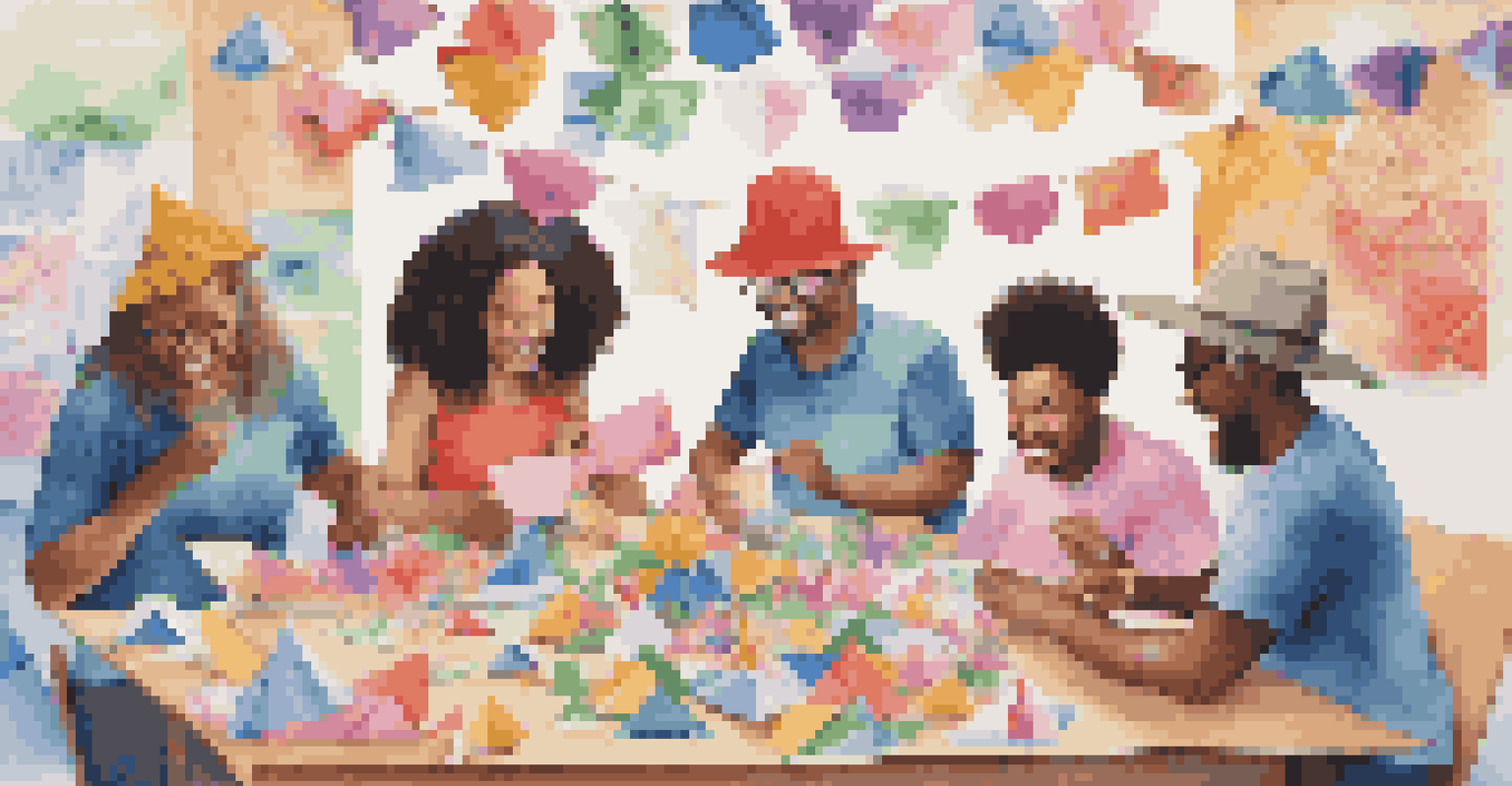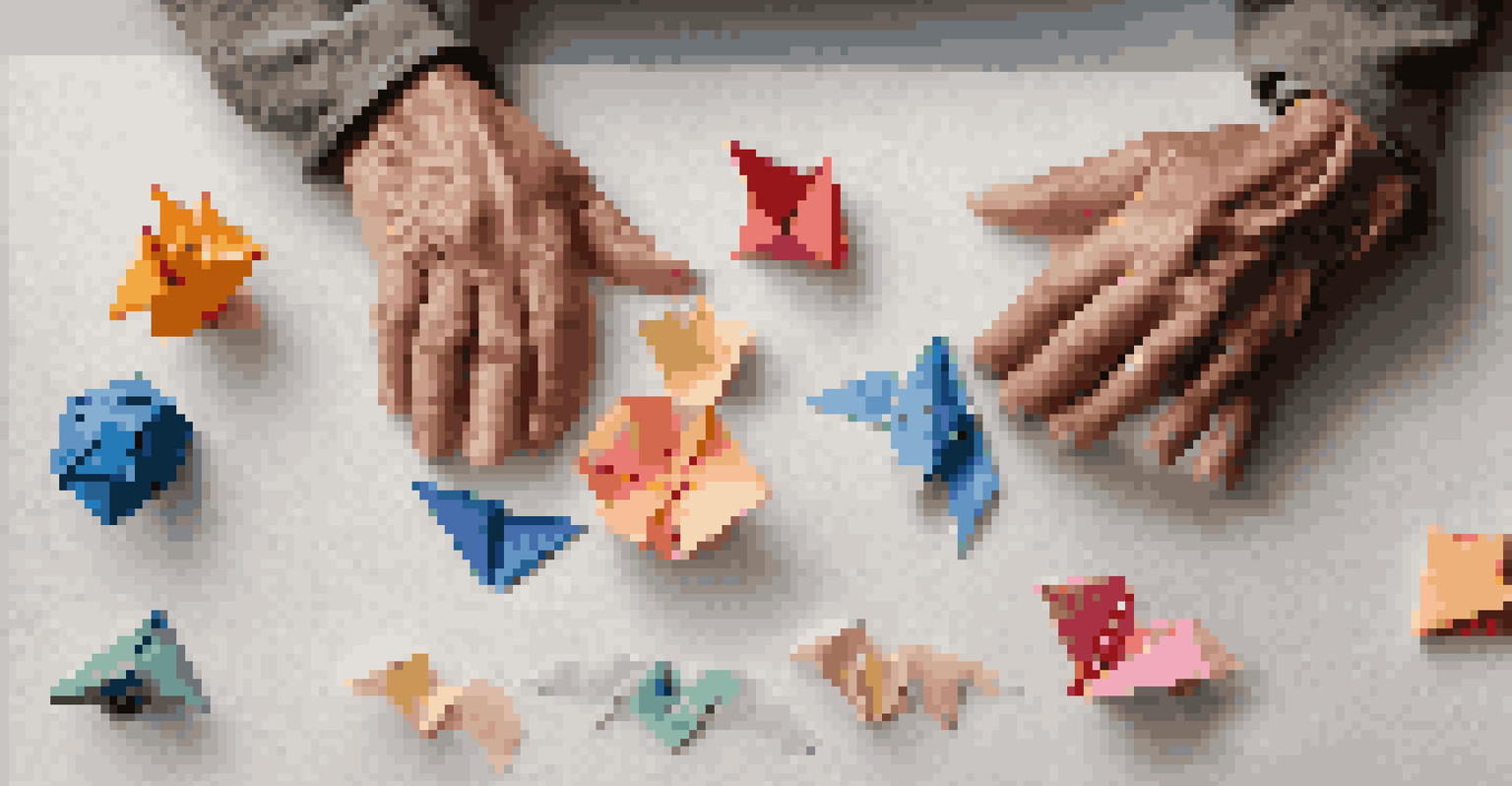Origami for Special Needs: Inclusive Activities for All

The Benefits of Origami for All Abilities
Origami, the art of paper folding, offers numerous benefits for individuals of all abilities. Not only does it enhance fine motor skills, but it also promotes cognitive development and patience. For individuals with special needs, engaging in origami can provide a sense of accomplishment and boost self-esteem.
Origami is a creative way to express oneself, no matter your ability.
Moreover, origami can be adapted to suit various skill levels, making it an inclusive activity. For instance, simple folds can be taught to beginners, while more complex designs can challenge advanced learners. This versatility ensures that everyone can participate and enjoy the creative process.
Additionally, origami encourages social interaction. Group activities can foster teamwork and communication skills, allowing individuals to connect with peers. As they collaborate on projects, they build friendships and create lasting memories.
Setting Up an Inclusive Origami Space
Creating an inviting space for origami is key to engaging everyone in the activity. A well-lit area with comfortable seating and ample work surfaces can make a big difference. Consider using tables that accommodate wheelchairs or individuals with mobility challenges to ensure inclusivity.

Having a variety of origami materials on hand is also essential. Offer different types of paper, such as colored, patterned, or textured options, to cater to various preferences. Providing tools like scissors, markers, and stickers can enhance creativity and allow for personal expression.
Origami Benefits All Abilities
Origami enhances fine motor skills, cognitive development, and social interaction, making it a valuable activity for individuals of all abilities.
Lastly, consider the sensory needs of participants. Some may prefer quieter spaces, while others may thrive in a lively environment. By being mindful of these preferences, you can create a supportive atmosphere that encourages everyone to explore the art of origami.
Simple Origami Projects for Beginners
Starting with easy origami projects can help build confidence and skill. Simple designs like paper boats, hats, or flowers are perfect for beginners. These projects require fewer steps, making them easier to follow and master, which is especially beneficial for those with learning difficulties.
Art is a collaboration between God and the artist, and the less the artist does the better.
Incorporating visual aids, such as step-by-step diagrams or video tutorials, can further enhance understanding. Visual learners greatly benefit from seeing the process unfold, making it easier to replicate the designs. This approach ensures that all participants can grasp the basics of origami.
Encouraging participants to personalize their creations can also spark excitement. Adding colors or decorations allows for individual expression, making each piece unique. This boosts motivation and helps participants take pride in their work.
Incorporating Technology in Origami Activities
Technology can play a valuable role in enhancing origami experiences. For example, apps and websites can provide interactive tutorials and virtual folding guides. These resources are beneficial for individuals who may struggle with traditional instructions, making learning more accessible.
Additionally, using tablets or smartphones can engage tech-savvy participants. They can explore origami designs, share their creations on social media, or even join online communities dedicated to paper folding. This fosters a sense of belonging and encourages continuous learning.
Creating Inclusive Origami Spaces
Setting up an inviting and accessible origami space with varied materials and sensory considerations fosters participation from everyone.
Moreover, incorporating technology can also aid in collaboration. Virtual meetings or online classes allow individuals from different locations to connect and share their love for origami, promoting inclusivity beyond physical spaces.
Adapting Origami for Different Abilities
Adapting origami techniques to accommodate various abilities is crucial for inclusivity. For individuals with motor skill challenges, using larger sheets of paper or pre-creased paper can simplify the folding process. These adaptations make it easier to manage and manipulate the materials, ensuring everyone can participate.
For those with visual impairments, consider using textured paper or implementing tactile guides. These adaptations help individuals feel the folds and understand the shapes being created. Encouraging touch and exploration enhances the learning experience and fosters creativity.
Additionally, offering one-on-one support or small group sessions can help address individual needs. Tailoring instruction based on participants' abilities ensures that everyone receives the guidance they require to succeed. This personalized approach strengthens confidence and encourages continued engagement.
Building Community Through Origami Events
Organizing community origami events can promote social inclusion and bring people together. Workshops or classes that welcome individuals of all abilities create a sense of belonging. These gatherings encourage participants to share their skills and creativity, fostering a supportive environment.
Consider partnering with local organizations that support individuals with special needs. This collaboration can help reach a broader audience and ensure that everyone feels welcome to join. By creating an inclusive atmosphere, you can break down barriers and celebrate diversity through the art of origami.
Long-term Impact on Special Needs
Engaging in origami cultivates resilience, creativity, and social connections, contributing to improved quality of life for individuals with special needs.
Additionally, showcasing participants' work at community events or exhibitions can boost morale and pride. Allowing individuals to display their creations validates their efforts and encourages continued participation. This recognition strengthens the community spirit and highlights the importance of inclusivity.
The Long-term Impact of Origami on Special Needs
Engaging in origami can have lasting positive effects on individuals with special needs. The skills learned through this art form extend beyond paper folding, promoting resilience, problem-solving, and creativity. These attributes can enhance daily living skills and overall quality of life.
Moreover, the friendships and connections formed during origami activities can lead to ongoing support networks. Participants often find camaraderie with others who share similar interests, fostering a sense of community that can last beyond the activity itself.

Ultimately, the practice of origami can contribute to a greater understanding and acceptance of diversity. As individuals come together to create and share, they learn to appreciate each other's unique abilities. This promotes a culture of inclusivity that can have a profound impact on society as a whole.